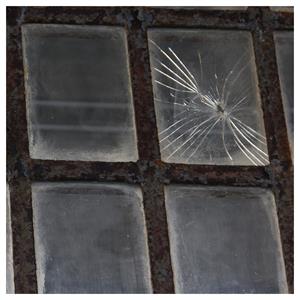
PUMPA - SMART LEARNING
எங்கள் ஆசிரியர்களுடன் 1-ஆன்-1 ஆலோசனை நேரத்தைப் பெறுங்கள். டாப்பர் ஆவதற்கு நாங்கள் பயிற்சி அளிப்போம்
Book Free DemoThere’s a dusty old window around at the side
With three cracked panes of glass,
I often think there’s someone staring at me
Each time that I pass,
I’ll peep through that window one day.
With three cracked panes of glass,
I often think there’s someone staring at me
Each time that I pass,
I’ll peep through that window one day.
Explanation:
The speaker further describes the shed in the second stanza. Apart from the rusty hinges on its door, the shed has a window at the side. It is old, dusty, and damaged. The line "three cracked panes of glass" provides more details of the shed; the shed has a broken window, and it has three cracked panes. It doesn't mean that the window had only three panes of glasses, but rather, the three of the panes were cracked.

A cracked pane of glass
Speaking of the line, "with three cracked panes of glass", it is interesting to note that the poet had stated that there were 'three' damaged sheets of glass. So why did he use the number three? And why not any other number?
Well, it is understood that the number \(3\) had played a significant role in literature and culture. Several of the folktales and literary works had 'three' in them. "Three Little Pigs", "Goldilocks and the Three Bears", "The Three Musketeers", "Three Men in a Boat", and "The Three Questions" are some of the famous stories that have the number in the title.
Moreover, the concept of three wishes, three choices/options, three chances, Trimurthi, and Trinity are noteworthy. Also, remember the 'three witches’ from Shakespeare's "Macbeth", or the 'three ghosts' from Dickens' "A Christmas Carol"? And not to forget the movie, "The Three Idiots". There is more to the number three, such as the Rule of Three. Hence, the number three is popular, heavily used, and easily accessible in language, literature, and culture.
Back to the poem, the speaker says how he often felt that someone was staring at him through the window whenever he went by it. The speaker is obviously scared, for we hear him say in the following line that he would "peep" through the window one day. In the earlier stanza, the speaker had expressed his resolution to 'open the door'; however, we see that it is getting weakened. He doesn't wish to open the door anymore; instead, he would be happier with a mere peep, and that too, through the window. The transition is clear: from "open" to "peep" and from "door" to "window".
The line "I’ll peep through that window one day" can be seen as a refrain with modification.
Back to the poem, the speaker says how he often felt that someone was staring at him through the window whenever he went by it. The speaker is obviously scared, for we hear him say in the following line that he would "peep" through the window one day. In the earlier stanza, the speaker had expressed his resolution to 'open the door'; however, we see that it is getting weakened. He doesn't wish to open the door anymore; instead, he would be happier with a mere peep, and that too, through the window. The transition is clear: from "open" to "peep" and from "door" to "window".
The line "I’ll peep through that window one day" can be seen as a refrain with modification.
Meanings of difficult words:
S.No | Words | Meanings |
1 | Dusty | To be covered with a fine powder of dirt or sand |
2 | Cracked | Damaged with lines in its surface but not completely broken |
3 | Panes | Sheets of glass in a window or door |
4 | Peep | To look quickly and secretly at something, especially through a small opening |
5 | Trimurthi | The three supreme gods in Hindu mythology, namely, Brahma, Vishnu, and Shiva |
6 | Trinity | The three persons of the Christian Godhead: Father, Son, and Holy Spirit |
Reference:
National Council of Educational Research and Training (2007). Honeycomb. The Shed: Frank Flynn (pp. 48 -49). Published at the Publication Division by the Secretary, National Council of Educational Research and Training, Sri Aurobindo Marg, New Delhi.